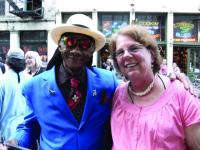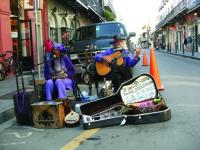Katrina - Eight Year Anniversary
Posted On: 8/30/13
Written By: Tish Michel
*Click images below to view larger versions.

The ever dapper Little Freddie King and I had a delightful chat outside the Louisiana Music Factory. As always, his show at Jazz Fest was fabulous. Freddie is one of the fortunate musicians to receive a home in the Musicians Village fairly recently after losing everything to Katrina.

Roselyn & David playing for tips on Royal Street. I enjoyed their performance at Jazz Fest as well as the Dew Drop In fundraiser. I am hoping the Dew Drop In will once again reopen in the not too distant future. This landmark spot for music has been sorely missed these many years!
I celebrated a huge birthday yesterday and also reflected on the 8th anniversary of Hurricane Katrina. My favorite city, outside of our fair home on the eastern shore, is New Orleans. Like O. C. last year with hurricane Sandy and Irene two years ago, New Orleans dodged the bullet on 8/29/2005. My prayers were answered that day as once again the Big Easy escaped the eye of a hurricane. The hurricane did much less damage than expected during the height of the storm. Eight years ago today while New Orleans residents were breathing a sigh of relief, the federally built levees breached as a direct result of years of neglect by the Corp of Engineers and all hell broke loose. Before it was all over, 80 percent of the city was under water, 1800 were dead, 200,000 homes were damaged or completely destroyed and the city suffered $135 billion in losses.
Earlier this month the Greater New Orleans Community Data Center released its findings and reported that the city shows great signs of reversing economic decline. The Data Center started working with the D. C. based Brookings Institute shortly after Katrina to track relevant economic data for the area. Compared to pre-Katrina, there has been a good increase in job rates and the entrepreneurship rate in New Orleans has increased 129 percent. Arts and culture continue to be hugely important for the city with 34 nonprofit groups focusing on creative pursuits per 100,000 as compared to a national rate of 13 per 100,000. The Data Center report still shows property and violent crime rates as well as incarceration rates well above national averages. Educational attainment is also well below the national average especially among minorities with only 11 percent of African-American males earning bachelor’s degrees.
For most of the middle and upper class New Orleaneans who survived the storm, life is pretty much back to normal. Their homes have been rebuilt and their neighborhood schools, churches, grocery stores and banks are back. This is not the case for the poorest residents in primarily black and Hispanic neighborhoods. According to the Data Center, there is a 29 percent poverty rate in New Orleans compared to 16 percent national rate. Allison Plyer, executive director of the Data Center, states in the summary report, “extending the benefits of the growing economic prospects to groups getting left behind will be crucial to ensuring that the city's gains continue. But unlike many other older cities with long records of economic waning, Louisiana and the New Orleans region have resources with the potential to lift people from lower prosperity levels.”
It has been much harder for low-income folks to return home and rebuild. lacks earn 50 percent less than white households and Hispanics are 30 percent below white incomes. Before the storm, 40 percent of low income renters paid more than 35 percent of their income for rent. Now more than half of poor families pay above 35 percent of their income on the escalated rentals. New Orleans has about 80 percent of its pre-Katrina population, but poor predominately black areas, such as like St Bernard, have about a 55 percent return rate because the government is rebuilding these areas last and folks can’t afford to come home.
The University of New Orleans completed a study last April concerning post Katrina recovery and reports that 79 percent of the homes damaged by the storm in the flood zone of Orleans and St. Benard’s parishes have been or are in the process of being rebuilt. The same study reports that 68 percent of the business community have reopened since the storm (up from 64 percent three years ago). The percent of derelict and demolished businesses (20 percent) remains about the same as when the survey was conducted in 2010. The worst areas remaining are Lake Forest Boulevard with 34 percent of businesses reopened and 43 percent derelict, and St Claude Avenue with 46 percent of the pre Katrina businesses reopened. If you followed the HBO series “Treme,” this is the St. Claude Avenue area adjacent to the world renowned French Quarter on the other side of Rampart Street.
I made a commitment to myself after Katrina to volunteer at the Jazz and Heritage Festival two weeks a year for ten years and write about the recovery of the greatest musical city in the world. Time is a great healer and much of the devastation has been replaced by renewal. A while back, Ned Cheever wrote in his column in the Times-Picayune that “Amid the loss, both of life and chattels, has risen a stronger community, one that has tapped the synergy of outreached hands from near and far. The remaining lives, homes, businesses, monuments, and traditions that have weathered the storm are now seasoned to stand against the next challenge. A testament to the dedication of a people united in their determination to prevail over forces of hardship and detriment, the rebirth of New Orleans represents a massive undertaking by man and machine. Obstacles of nature and government often seemed to resist the progress at every turn, but the task of recovery has been constant and certain. Much remains to be done, but we should celebrate the accomplishments that have borne the fruit of progress. New Orleans has regained its stature and charm, remaining one of America’s great cities.”
Each year I am so amazed with the progress and at the same time so astounded by areas still looking like the storm hit just yesterday. Believe me, even eight years later, it’s not too late to help. New Orleans still needs volunteers and money. Please come to New Orleans and spend money. Please put sizable tips in local musicians tip jars. Please enjoy the great music this city has to offer. Come for Jazz Fest the last weekend of April and first weekend of May. Get out of the French Quarter and enjoy the music scene on Frenchman Street. Talk with the locals. Take a taxi tour of the areas still totally devastated from Katrina eight years later.
As always, Jazz Fest was great this year. I plan to finalize my booking for Jazz Fest in October so I can stay my usual full two weeks at the Olivier House and volunteer for the ninth year in a row with the Jazz and Heritage Foundation. It’s fun and helps support the best fest in the world. Jazz Fest needs good volunteers, so give it some thought and plan a trip to N’walins. You’ll be so glad you did.
